Ata-ul-Haye Nasir, Ahmadiyya Archive & Research Centre
Hazrat Musleh-e-Maud, Mirza Bashiruddin Mahmud Ahmadra provided valuable guidance and support to the leaders of the Pakistan Movement and played a pivotal role at many crucial junctures. This article aims to present a few glimpses of those services.
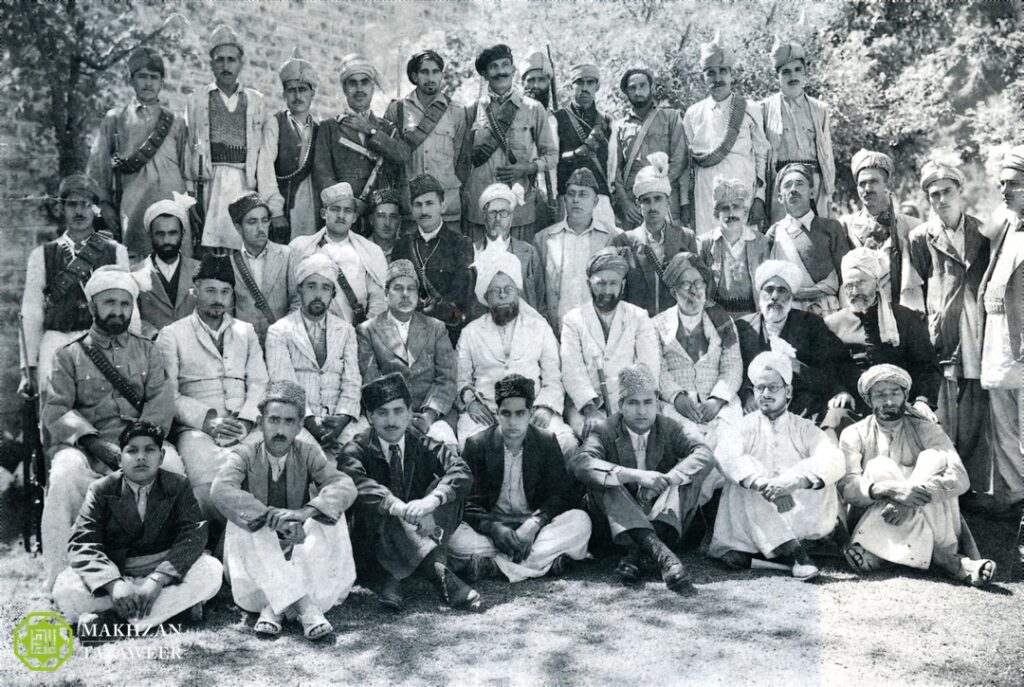
Separate electorates
The Muslims of the Indian subcontinent presented many demands from time to time and all of them had their own importance, but the demand for separate electorates was a special one. This is because, considering the circumstances of British India at the time, it was inevitable for protecting the rights of the Muslims. Consequently, the right for separate electorates played a pivotal role in the formation of Pakistan.
On 20 March 1927, Muslim leaders had a meeting in Delhi – presided by Jinnah – to discuss the basic demands of Muslims, including the separate electorates. They agreed to compromise the demand for separate electorates in an effort to break the ice and decided to offer Hindus the withdrawal of this demand, provided all other demands were accepted. (Quaid-e-Azam Aur Unka Ehad – Hayat-e-Muhammad Ali Jinnah, by Raees Ahmad Jafri, p. 137)
These proposals are commonly known as “The Delhi Proposals”.
Considering the greater interest of the Muslims, Hazrat Musleh-e-Maudra raised his voice for separate electorates.
During his visit to Simla in 1927, Huzoorra had a conversation with Jinnah on this issue. Jinnah stated that nationalism could only be inculcated through joint electorates. Huzoorra responded that he agreed to the extent that joint electorates are essential for nationalism, however, considering the circumstances at the time, when the Muslims were weaker and unable to cope with the power and majority of Hindus, separate electorates were the need of the time. But Jinnah did not agree to quit his stance. (Tarikh-e-Ahmadiyyat, Vol. 4, pp. 619-620)
During the Unity Conference of Hindu and Muslim leaders, on 7 September 1927, Huzoorra presented his proposals for the establishment of peace and harmony between Hindus and Muslims, which had already been published on 1 September in the form of a 20-point memorandum, and was sent to the leaders of both parties. (Ibid.)
Those 20 points proposed by Huzoorra also included a suggestion that though the idea of joint electorates is correct principally, it was not suitable for the Muslims during the prevailing circumstances of India, and that it was dangerous for their interests. Huzoorra said that Jamaat-e-Ahmadiyya, Muslims of Punjab and the Muslims of some other provinces were not ready to accept the joint electorates at the time. He demanded that the right for separate electorates should continue for the Muslims, and for other parties as well, if they liked it. (Zamima Al Fazl, 16 September 1927)
In the evening of 7 September, another session commenced under the chairmanship of Jinnah, where Huzoorra delivered a speech in favour of separate electorates and most of the speakers agreed with Huzoor’sra views and spoke in favour of separate electorates. Jinnah, after delivering his concluding speech, stated that now he knew that the majority of the nation favoured separate electorates and when the decisive time would come, he would cater for their views. (Tarikh-e-Ahmadiyyat, Vol. 4, p. 620)
Hazrat Musleh-e-Maud’sra view in favour of the separate electorates had a great impact on Jinnah and other Muslim leaders, who were initially unable to realise how crucial this demand was under the prevailing circumstances. As a result, later on, Jinnah and many other Muslim leaders realised the importance of this demand and stood firm on it.
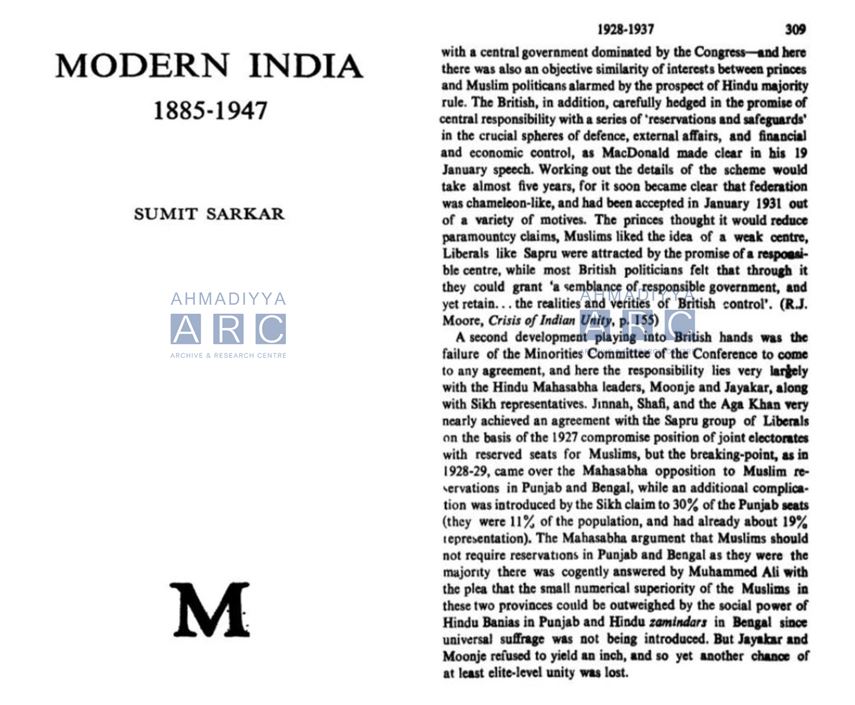
For instance, in 1928-1929, leaders of the Hindu Maha Sabha opposed the Muslims’ demand for the reservation of seats in Punjab and Bengal, and asserted that the Muslims did not require reservations in Punjab and Bengal as they were the majority there. In response to this, Muhammad Ali pleaded that “the small numerical superiority of the Muslims in these two provinces could be outweighed by the social power of Hindu Banias in Punjab and Hindu zamindars in Bengal since universal suffrage was not being introduced.” (Modern India: 1885-1947, Sumit Sarkar, p. 309, Macmillan India Limited, 1959)
It is crystal clear that Hazrat Musleh-e-Maudra considered that, though the idea of joint electorates was principally correct, it was not favourable amidst the situation of British India. Therefore, after the creation of Pakistan, when the question arose in regard to the introduction of joint electorates in West Pakistan, Huzoorra spoke in favour of the joint electorates. While mentioning this development, The Civil and Military Gazette reported:
“Muslim League and Jamaat-i-Islami circles yesterday criticised the National Assembly decision to have joint electorates for West Pakistan while its introduction was justified by the head of the Ahmediya Community, Mirza Bashiruddin Mahmood, due to changed conditions in the country. […]
“In a telegram from Rahmat to the Foreign Minister of Pakistan, Malik Firoz Khan Noon, Mirza Mahmood said that at one time he was of the opinion that a separate electorate should be continued in India. But now, he said, conditions had completely changed.” (The Civil and Military Gazette, 27 April 1957, p. 12)
For more details on this visit to Simla, see “Communal harmony, Unity Conference and Muslim rights: Hazrat Musleh-e-Maud’s 1927 visit to Shimla”, at alhakam.org.
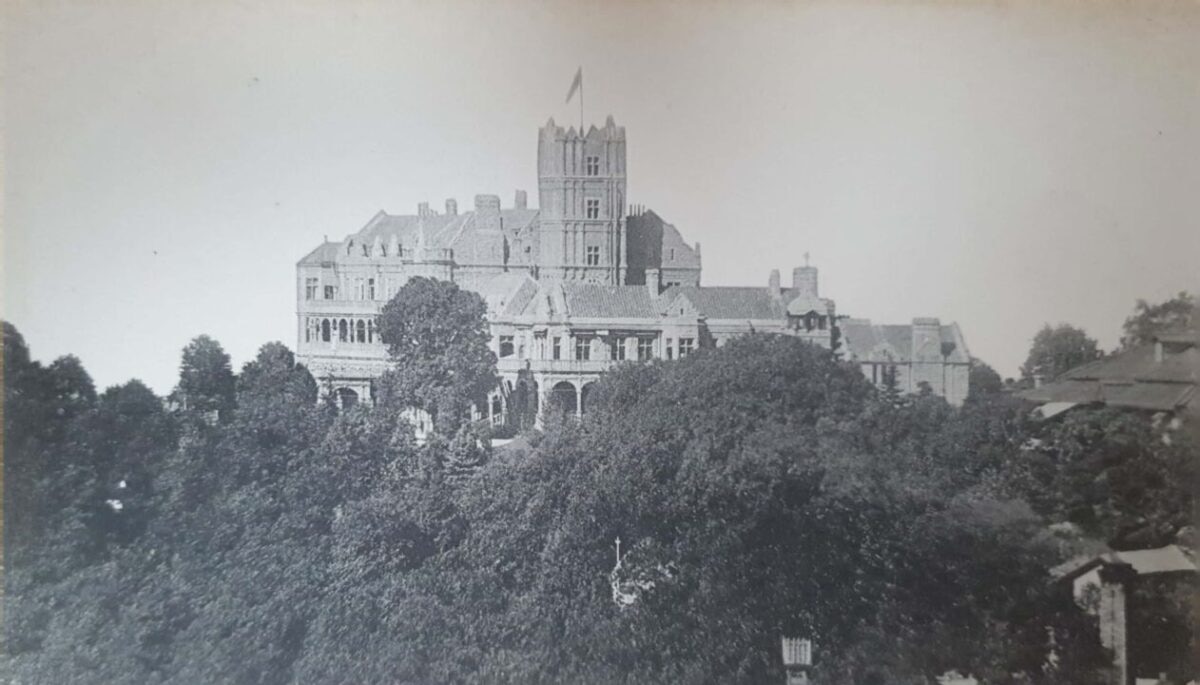
Uniting the All-India Muslim League
The All-India Muslim League had divided into two groups over the issues of the above-mentioned Delhi Proposals and boycotting the Simon Commission. One group was led by MA Jinnah, while the second was led by Sir Muhammad Shafi.
Hazrat Khalifatul Masih IIra wrote letters to Dr Muhammad Iqbal (Secretary Shafi League) and Jinnah, wishing to see both groups united.
In March 1929, Sir Muhammad Shafi and Muhammad Ali Jinnah had a meeting, in which Hazrat Mufti Muhammad Sadiqra was also present. Both leaders agreed to unite and the Muslim League’s session was called on 28-30 March in Delhi; Huzoorra was also invited.
Huzoorra could not attend himself but sent Hazrat Mufti Sahibra. Sir Shafi also could not attend due to illness.
Then, on 28 February 1930, an important session of Muslim League Council was held in Delhi, chaired by Jinnah. It was announced there that both groups of the League were now united.
Jinnah’s return to Indian politics
Quaid-e-Azam was striving hard for the Indian Muslims, but when he suffered disappointment on the part of Indian politics, he moved to England and decided to settle there. In that situation, Huzoorra wished to bring him back to India to continue the struggle, so he instructed Hazrat Maulvi Abdur Rahim Dardra to persuade Jinnah to return.
Hazrat Maulvi Abdur Rahim Dardra had meetings with Jinnah and tried to convince him. Upon Dard Sahib’s invitation, Jinnah attended an event on the occasion of Eid-ul-Adha at the Fazl Mosque in London, in April 1933. Jinnah delivered a speech on the future of India.
This speech attracted many newspapers of the British and Indian press, including The Statesman, Madras Mail, Hindu, Sunday Times, etc.
The Sunday Times of London reported:
“There was also a large gathering in the grounds of the little mosque in Melrose Road, Wimbledon, where Mr Jinnah, the famous Indian Moslem, spoke on India’s future. The chair was taken by Sir Nairne Stewart Sandeman, MP, and there were quite a number of other non-Moslems present.
“Mr Jinnah made unfavourable comments on the Indian ‘White Paper’ and the ‘safeguards’ from a national point of view. The chairman, in reply, took up the Churchill attitude on the subject, and this led to heckling by some of the Muslim students present, who were, however, eventually calmed by the Imam of the Mosque.” (Sunday Times, 9 April 1933)

During his speech, Jinnah said:
“The eloquent persuasion of the Imam left me no escape.” (Encyclopaedia Quaid-e-Azam, p. 780, Zahid Hussain Anjum)
Elaborating on this, the Pakistan Times stated:
“It was Mr. Liaquat Ali Khan and Maulana Abdur Rahim Dard[ra], an Imam of London Mosque, who persuaded Mr. M. A. Jinnah to change his mind and return home to play his role in the national politics. Consequently, Mr. Jinnah returned to India in 1934 and was elected to the Central Assembly, un-opposed.” (Pakistan Times, 11 September 1981, Quaid-I-Azam Anniversary Supplement, p. 11, col. 1)
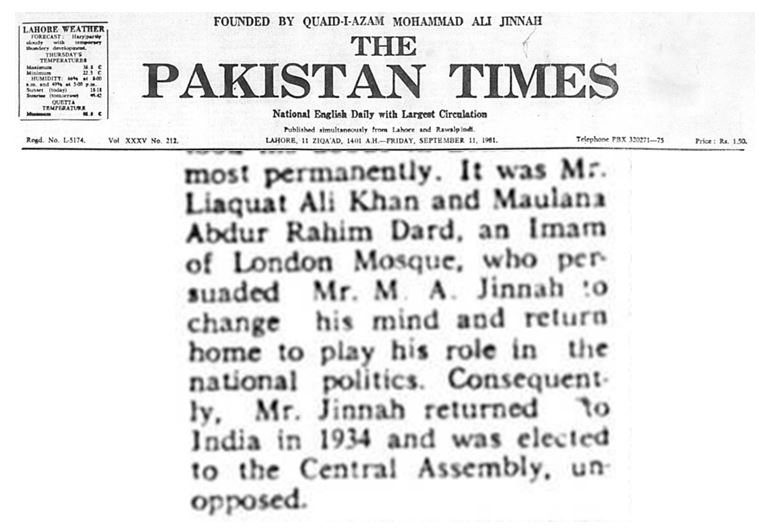
Nawab Bahadur Yar Jung’s meetings with Huzoorra
Nawab Bahadur Yar Jung was a prominent Muslim leader and one of the closest friends of Jinnah. Bahadur Yar Jung was greatly impressed by Hazrat Musleh-e-Maudra.
Seith Muhammad Azam Hyderabadi states that during the visit of Hyderabad in October 1938, Huzoorra had a long conversation with Bahadur Yar Jung on the issues of Muslims in Hyderabad. He further stated that Bahadur Yar Jung often expressed that he was impressed by the political insight and intellect of Hazrat Musleh-e-Maudra and Jinnah.
After the jalsa on 22-24 March 1940 in Lahore, where the Pakistan Resolution was passed, Bahadur Yar Jung visited Qadian on his way back to Hyderabad. He had a sitting with Huzoorra and discussed matters of mutual interest. (Tarikh-e-Ahmadiyyat, Vol. 8, pp. 43-49)
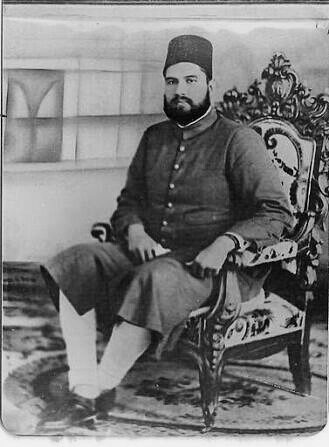
Wavell Plan
On 14 June 1945, the Viceroy of India, Lord Wavell delivered a speech on radio and announced a plan for a new Executive Council in which all members, except the viceroy and the commander-in-chief, would be Indians. This executive council was to be a temporary measure until a new, permanent constitution could be agreed upon and come into force.
In light of this, Huzoorra addressed Indian leaders during his Friday Sermon of 22 June 1945 and stated:
“There can be no possible shadow of doubt that whatever rights we do get, no matter whether they are large or small, it is emphatically in our interest to grasp them firmly and turn them to our advantage. By doing so we shall be bringing the day of India’s Independence nearer. I am firmly of [the] opinion that we should gladly accept this proposal. We should do so not for the sake of doing a good turn to Great Britain, but for the good of our own souls, and for the good of the coming generations of our children.” (The Review of Religions, Vol. 44, p. 108, July 1945)
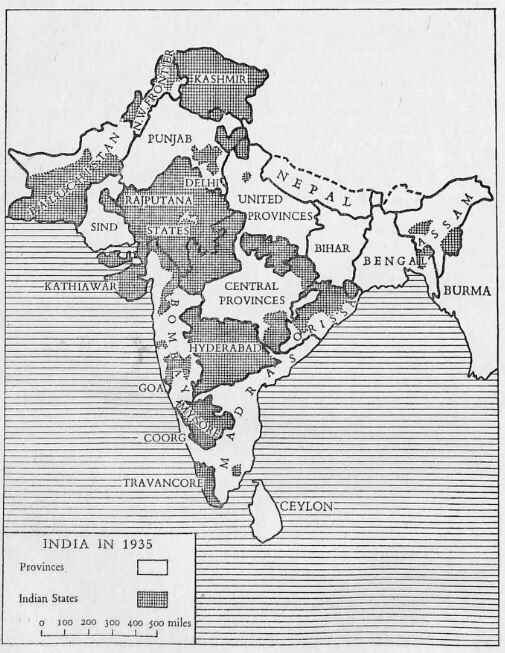
Elections of 1945-46
In the beginning of October 1945, Muhammad Sarwar Dani of District Roypur wrote a letter to Huzoorra and requested for guidance regarding the upcoming elections. In response, Huzoorra wrote a letter and said:
“You ought to support Muslim League in the present elections and offer them whatever means of co-operation and assistance you can possibly afford. Muslims do require a united front in the present crisis. Their differences, if allowed to exist, will affect them adversely for hundreds of years to come.”
Nazir umur-e-ama Qadian sent Huzoor’sra above-mentioned correspondence to Jinnah and it had so much importance in the view of Jinnah that he got this published in the Dawn newspaper of Delhi on 8 October 1945, titled “Ahmadiya Community To Support Muslim League – Qadian Leader’s Guidance”.
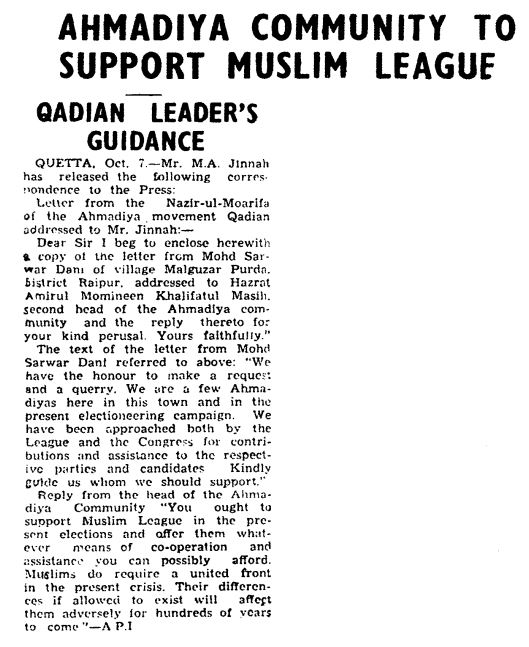
Hazrat Musleh-e-Maudra wrote an article, titled “Jamaat-e-Ahmadiyya’s Policy Regarding the Upcoming Elections”, on 21 October 1945. He narrated his views about the future of India, in light of both demands – the partition of India and United India. After elaborating the whole situation, he stated:
“I have come to the conclusion that during the upcoming elections, every Ahmadi should support the policy of the Muslim League, so that after the elections, the Muslim League can say to the Congress without any fear of denial that it is representative of the Muslims. If we and other Jamaats will not do so, then the political stature of the Muslims will weaken, and in the upcoming system of India, their voice will prove ineffective. And it will cause the Muslims such political and economic setback, which will make it very difficult for them to attain stability in the next 40 to 50 years. […] So, through this announcement […] I advise Ahmadis of all provinces that they should support the Muslim League in their respective areas with full force and power, in such a way that all votes of Ahmadis should be cast to the Muslim League’s contestant of the constituency.” (Al Fazl, 22 October 1945, p. 3)
Mentioning Jamaat-e-Ahmadiyya’s support for the Muslim League in his book, Quaid-e-Azam Aur Unka Ehad – Hayat-e-Muhammad Ali Jinnah, Raees Ahmad Jafri has written that the Ahmadiyya Community favoured the Muslim League, Pakistan Movement and the political leadership of Jinnah. He then quoted Huzoor’sra above-mentioned announcement.
After mentioning Huzoor’sra announcement, the author raised a very pertinent question as to who was supporting the establishment of Pakistan, showing concern for the future of Muslims and striving for their success.
He finally answers his question himself:
“Those against whom there is a knapsack of the edicts of ‘kufr’, whose non-Muslimness is talked about everywhere, [and] whose faith and belief is considered to be doubtful, suspicious and objectionable.” (Quaid-e-Azam Aur Unka Ehad – Hayat-e-Muhammad Ali Jinnah, pp. 344-346)
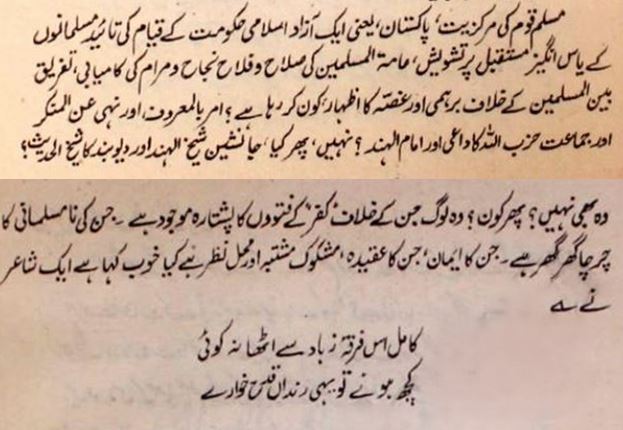
Chaudhry Abdul Malik Sahib, President Jamaat-e-Ahmadiyya Bahlolpur, wrote to Huzoorra that Hafiz Abdullah [an opponent of the Jamaat] was running for the Muslim League’s ticket for central assembly. In response, Huzoorra stated:
“The person who is running for the Muslim League’s ticket should be voted for. Although Abdullah is our severe opponent, [you should] not only vote for him, but also exert full effort to make him win.” (Tarikh-e-Ahmadiyyat, Vol. 9, p. 284)
A prominent leader, Sirdar Shaukat Hayat, states:
“One day, I got a message from Quaid-i-Azam saying ‘Shaukat, I believe you are going to Batala, which I understand is about five miles from Qadian. Please go there and meet the Hazrat Sahib of Qadian, request him on my behalf for his blessings and support for Pakistan’s cause.’
“After the meeting that night at about Twelve mid night, I reached Qadian. When I got there, Hazrat Sahib had retired. I sent him a message that I had brought a request for him from the Quaid-i-Azam. He came down immediately and enquired what were Qaid’s orders. I conveyed him Quaid’s message to pray for and also support Pakistan. He replied ‘Please convey to the Quaid-i-Azam that we have been praying for his Mission from the very beginning. Where the help of his followers is concerned, no Ahmadi will stand [in elections] against a Muslim Leaguer.’” (The Nation That Lost its Soul, p. 147)
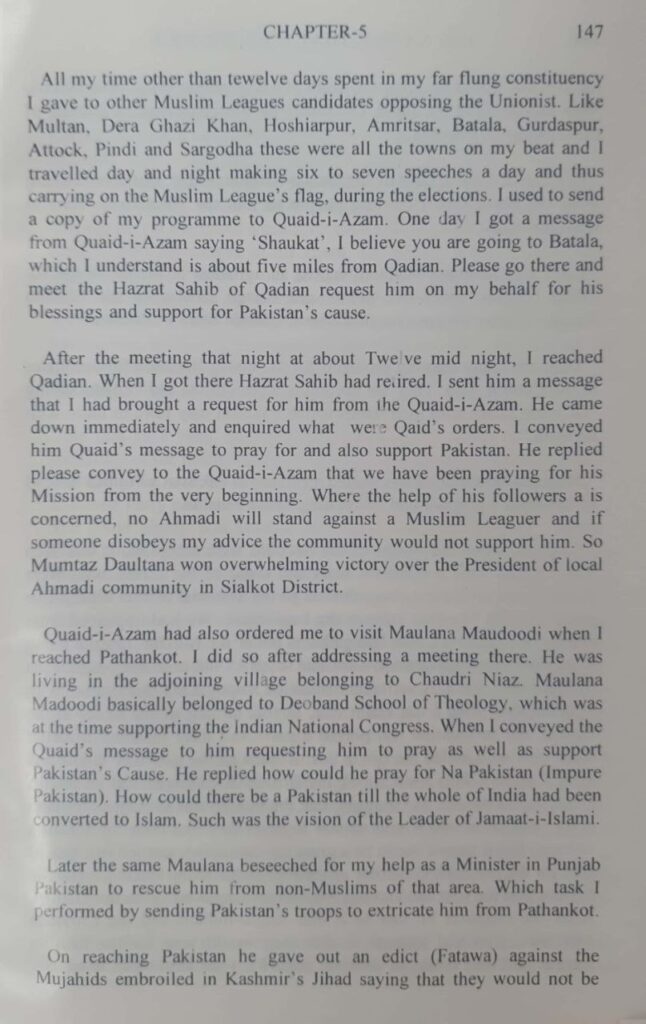
The elections for the central assembly were held in December 1945 and the Muslim League won all 30 seats which were reserved for Muslims. Then the elections for the provincial assemblies were held in January 1946 and Muslim League gained a great victory.
Cabinet Mission
After these elections, Prime Minister Clement Attlee sent a delegation to India, commonly known as the “Cabinet Mission”, to discuss the transfer of powers from the British government to the Indian leadership and suggested a system for India with three tiers: the provinces, provincial groupings and the centre.
Upon this, Huzoorra wrote an article, titled Parliamentary Mission Aur Hindustanion Ka Farz, which was published in 6 April 1946 issue of Al Fazl. He strongly favoured the views of the Muslim League and shed light on the baseless propaganda carried out by the Congress. (Al Fazl, 6 April 1946, pp. 1-7)
Its English translation was published in May 1946 issue of The Review of Religions, titled The Cabinet Mission and the Duty of Indian Leaders. (The Review of Religions, Vol. 45, pp. 78-93, May 1946)
A part of this article was published in the newspaper, Inqilab of Lahore on 19 April 1946 (p. 3).

Interim government
After talks of nearly two months, it was announced that an interim government would be formed. The Muslim League agreed to be part of the interim government, but Congress denied. So, as per the agreement, the Muslim League had the full right to form the government while Congress disagreed.
At that time, Huzoorra stated:
“Though Congress has accepted the scheme of the parliamentary mission in regard to the permanent system, it has rejected the suggestion regarding an interim government. The mission had announced that if any party would not accept its suggestions regarding the interim government, even then it would form the government. According to this announcement, it is now its [the mission’s] obligation to form an interim government with the co-operation of other parties save the Congress.” (Al Fazl, 28 June 1946, p. 3)
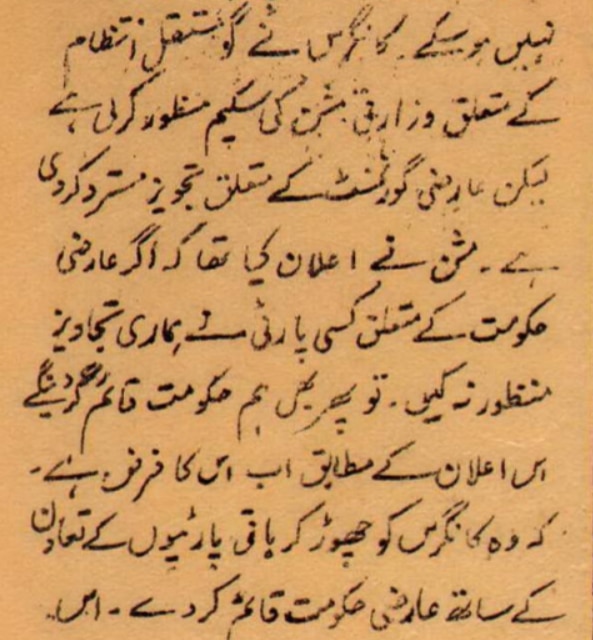
But Lord Wavell, Viceroy of India, did not fulfil the promise and withdrew the agreement. So, as a reaction, the Muslim League Council cancelled its first decision (of 6 June 1946) to be a part of the interim government with Congress. Consequently, Congress saw it as their best chance to dominate and eventually, the viceroy of India invited Congress to form an interim government.
A new hope arose when talks between the Muslim League, Congress and the government restarted.
Hazrat Musleh-e-Maudra went to Delhi on 22 September 1946 and started meeting with prominent political leaders, including Jinnah and Gandhi.
On 5 October 1946, Huzoorra sent a letter to the viceroy of India and stated that Jamaat-e-Ahmadiyya is a religious Jamaat and hence, it is not a part of the Muslim League as a whole, however, during the current political turmoil, the Jamaat’s sympathies and support is with the Muslim League. (Al Fazl, 7 October 1946)
In another letter, Huzoorra wrote that if the talks ended without any solution, then instead of being disappointed, more time should be given to finding a solution for this conflict.
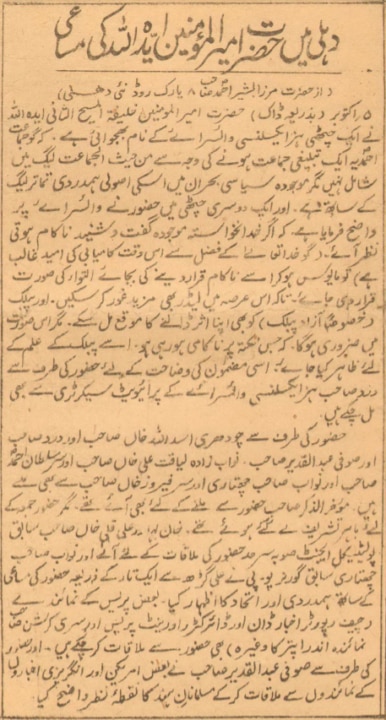
Huzoorra wrote the third letter to the viceroy, at a time when on the evening of 10 October, talks between the Muslim League and Congress took a delicate turn and seemed to be unsuccessful again. Moreover, Huzoorra instructed the Jamaat to pray in this regard, during his Friday Sermon of 11 October 1946. (Al Fazl, 30 October 1946)
With Huzoor’sra efforts, this matter moved towards its solution and the Muslim League agreed to cooperate in regard to the interim government without compromising their initial demands and informed the viceroy on 13 October 1946 about this decision.
When the allotment of portfolios was announced, Huzoorra wrote a letter to Jinnah on 27 October 1946, and stated:
“The new allotment of portfolios has been announced. Though their distribution is not equitable yet I must congratulate you on your successful efforts. […] May Allah help you in your great task and lead you to the right path. Amen” (Tarikh-e-Ahmadiyyat, Vol. 10, p. 464)
When Jawaharlal Nehru Sahib wanted to hold the legislative assembly’s session on 9 December 1946, the viceroy denied by saying it was not the appropriate time. Upon Nehru’s insistence, the viceroy agreed, but Quaid-e-Azam boycotted the assembly.
Hazrat Musleh-e-Maudra sent a message to the prime minister Mr Attlee, which was conveyed to him by Chaudhry Mushtaq Ahmad Sahib Bajwa, then Imam of the London Mosque, in a letter dated 8 December 1946. In his message, Huzoorra advised Mr Attlee that he should not favour Congress by undermining the interests and rights of the Indian Muslims. (Tarikh-e-Ahmadiyyat, Vol. 9, p. 334)
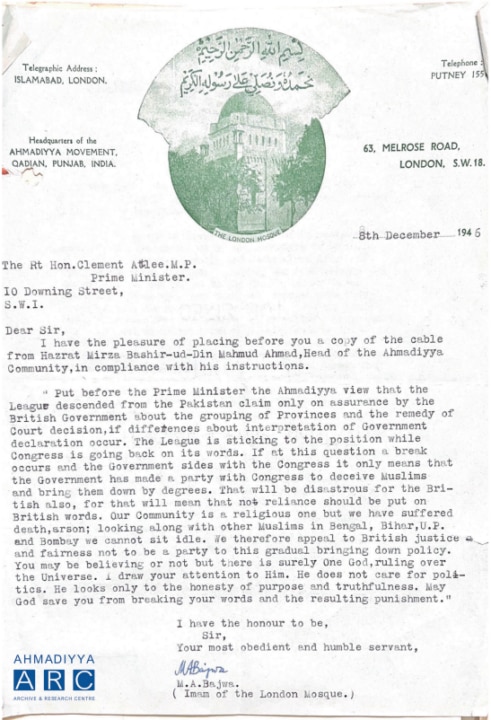
Therefore, the government had to announce on 9 December 1946 that the constitution made by the assembly without the Muslim League would only be applicable on the Hindu majority areas, not the Muslim majority areas.
An announcement from the British prime minister
On 20 February 1947, Clement Attlee announced that the government wished to implement necessary plans to transfer power to responsible people of India by 8 June 1948.
Sir Khizar Hayat’s resignation
Sir Malik Khizar Hayat Tiwana, Unionist Premier of the Punjab, resigned from his post on 2 March 1947, in which Sir Zafrulla Khanra played a huge role.
In regards to this, Hazrat Khalifatul Masih IIra wrote a letter to MA Jinnah on 2 March 1947, and stated:
“[…] On HMG’s new declaration, Sir M Zafrullah Khan approached Sir Khizar suggesting that at this critical juncture he should not fail his community. Malik Sahib then asked Sir Muhammad Zafrullah Khan to come to Lahore. As I also, on my way to Sind, had to stay there for one night, Sir Muhammad came there yesterday and discussed the matter with me. Following this, last night, he had a long discourse with Malik Sahib and Qizilbash. They have agreed to resign. […] Now you have a great lever to get Muslim rights from your opponents. Now only the NWFP remains. I will try to study its situation. I hope you will get help from some other sources as well, but no more can be disclosed in a letter. Maybe we meet at Delhi in April.” (Jinnah Papers, Vol. 1, Part I, pp. 164-165)
After the resignation, the Congress Working Committee passed a resolution during its session held on 6-8 March 1947 that Punjab should be divided into Muslim and non-Muslim Punjab and on 4 April, it was announced on All India Radio that the government was considering such suggestion.
Upon this, Hazrat Musleh-e-Maudra sent a telegram to the viceroy of India, in which he stated that he and his Jamaat fully condemned the suggestion of dividing Punjab and especially the suggestion that Central Punjab should be separated from Western Punjab. He added that Muslims had a clear majority in the central parts of Punjab and they deserved the same rights as that of a nation living in any part of the world. (Al Fazl, 17 April 1947, p. 2)
Furthermore, The Sunday Post reported that Huzoorra sent a telegram to Mr Attlee on 24 May 1947 as well:
“The head of the Ahmadya community, a powerful Moslem sect, sent a telegram from Lahore yesterday to Mr Attlee and Mr Churchill strongly protesting against any partition of the Punjab.” (The Sunday Post, 25 May 1947, p. 1)
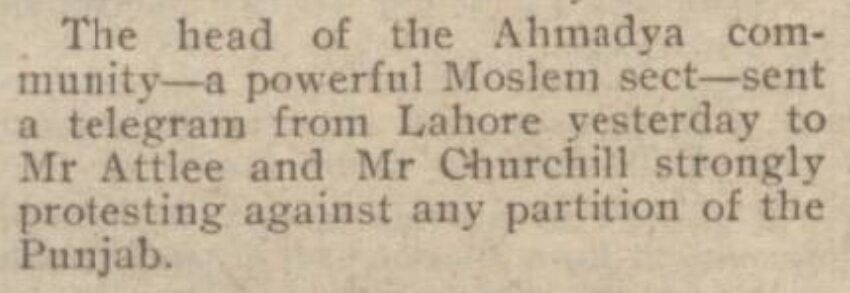
Guidance regarding the division of Punjab and NWFP
On 1 May 1947, Huzoorra delivered a speech, titled “Hindustani uljhanon ka aasaan tareen hal” (A simple solution to the problems of India). During this speech, he advocated that the people of India deserved the right to determine their future themselves, instead of the foreigners deciding it unilaterally. He also granted valuable guidance in regards to the division of Punjab and the North-West Frontier Province (NWFP). (Anwar-ul-Ulum, Vol. 18, pp. 551-561)
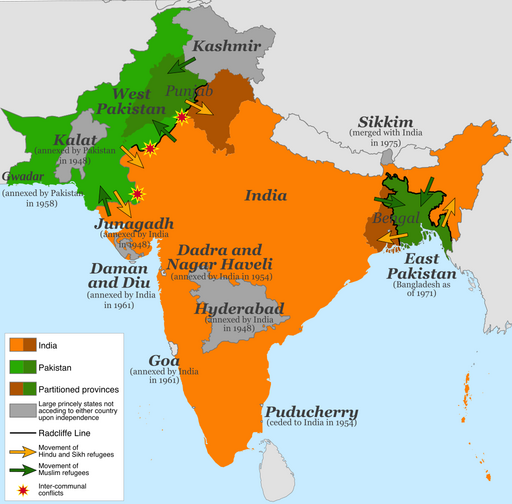
Huzoor’s response to an editorial of Akhbar Riasat
Delhi’s newspaper “Riasat” commented in its editorial that Ahmadis were supporting the Pakistan Movement, but soon after the creation of Pakistan, the [non-Ahmadi] Muslims would treat them exactly as the Afghan government had treated them in the past.
Upon this, during his speech on 16 May 1947, Hazrat Musleh-e-Maudra stated that in a situation like this, a divine community which is purely based on religion, morals, and justice, will keep in mind the rights of the people while making any decision, instead of seeking its own benefit:
“No matter in what way Muslim Leaguers treat us after the formation of Pakistan, whether they treat us the same as Kabul, or even with more severity, the question right now is, who is right in this dispute between Hindus and Muslims, and who is wrong. […] We have many times called the attention of Hindus that they are suppressing the rights of the Muslims. […] We have many times cautioned the Hindus that it is unjust to ignore the rights of the Muslims in such a way and many times we made the Hindu leaders aware that this suppression of rights and injustice will have its consequences one day. […] They suppressed the rights of the Muslims in arrogance of their majority. […] We had also repeatedly called the attention [of the English Government] towards the fact that it is completely wrong to deprive tens of millions Indian Muslims of their rights. But they did not pay attention to it either. […] I had visited Delhi in October-November last year with an intention to make efforts to foster peace between the Congress and the Muslim League. […] I had left no stone unturned to foster peace between the Hindus and the Muslims, but unfortunately, no one paid heed to my advice. […] No doubt, we often face problems from the [non-Ahmadi] Muslims and let us assume that they might hang us on the gallows, but I ask the Hindus, when did they provide us comfort, when did they give us peace […] and when did they show sympathy towards us. […] It is our obligation to help the oppressed community, no matter if they kill us or harm us. We have been harmed by every community.” (Al Fazl, 21 May 1947, pp. 1-6)
Hazrat Khalifatul Masih IVrh, in a question answer session on 27 April 1997, stated that Gandhi and Nehru sent a message to Hazrat Musleh-e-Maudra and asked that since they consider him a very wise person even in the political matters, they wonder as to why he is supporting the Pakistan movement. The message further stated that the Ahmadis would be harshly treated and persecuted in the proposed Pakistan, so why are they joining it.
Upon this, Hazrat Musleh-e-Maudra gave a detailed response and stated that the Ahmadiyya Muslim Jamaat will always remain loyal to Islam and the Muslim community. Regardless of how the Ahmadi Muslims are treated, they will always give priority to the Muslim rights and interests.
Another speech
On 29 May 1947, Huzoorra delivered another speech in which he advised the Muslims of India to act with perfect planning and to beware of the sensitivity of the ongoing situation. (Al Fazl, 17 June 1947)
Announcement of 3 June 1947
On 3 June 1947, the new Viceroy of India, Lord Mountbatten announced the partition of British-India into two independent nations – India and Pakistan.
Boundary Commission
When a Boundary Commission was formed for the division of Punjab and Bengal, Jamaat-e-Ahmadiyya, under the guidance of Huzoorra, continued to support the Muslim League and submitted its own Memorandum as well in support of the Muslim cause.
In relation to the sessions of Boundary Commission, Hazrat Musleh-e-Maudra sent a message to Quaid-e-Azam through Hazrat Maulvi Abdur Rahim Dardra, in which he stated:
“You may insist for Satluj [river], but at the same time, tell them that we will not agree if we are pushed beyond Beas [river]. […] In fact, we wish that the whole Punjab is not divided, but in case we accept the division, then our safe viewpoint is Beas, not Satluj.” (Tarikh-e-Ahmadiyyat, Vol. 9, p. 388)
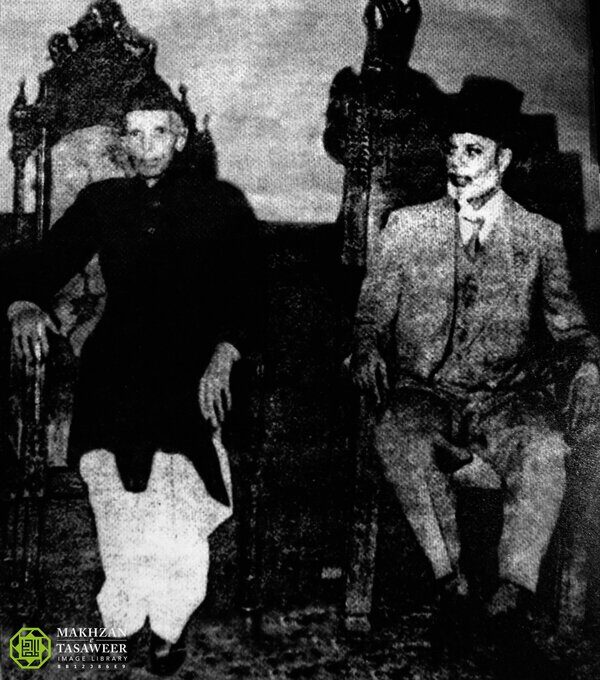
Helping the oppressed Muslims of Amritsar, Hoshiarpur and Ludhiana
As the time for the transfer of power was nearing, Muslims had to face many tribulations and oppression. Amritsar’s Muslims were also under huge oppression and Huzoorra instructed Khuddam-ul-Ahmadiyya to organise a Relief Camp in Amritsar and help the Muslims.
Due to the oppressions in some areas, including Amritsar, Hoshiarpur and Ludhiana etc., the Muslims started inhabiting Batala and Qadian. On 12 August 1947, Huzoorra appointed Hazrat Maulana Jalaluddin Shams as in-charge of migrants and instructed to aid them and take care of their food and residence etc.
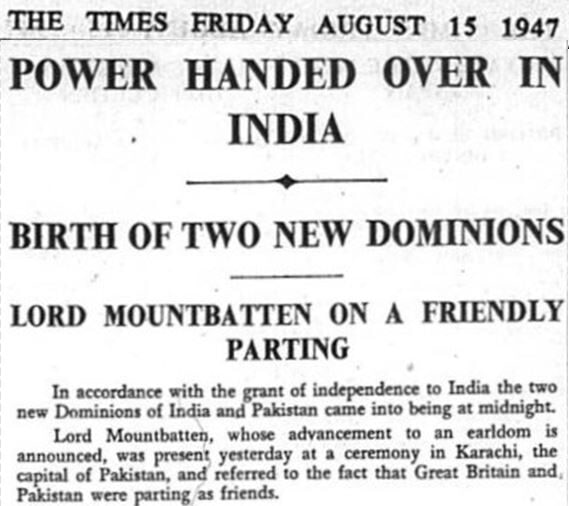
Muslim majority areas assigned to India
At first, the Muslim majority areas of Batala, Gurdaspur and Pathankot were affiliated to Pakistan, but later, on 17 August 1947, they were assigned to India and thus Qadian became part of India.
In this regard, it is worth mentioning that the opponents of Ahmadiyyat raised an objection in front of the Court of Inquiry about the 1953 Punjab disturbances, that Gurdaspur was assigned to India due to the attitude adopted by the Ahmadis and the arguments addressed by Sir Zafrulla Khan Sahibra. In his report, Justice Muhammad Munir stated:
“The President of this Court, who was a Member of that Commission, considers it his duty to record his gratitude to Chaudhri Zafrullah Khan for the valiant fight he put up for Gurdaspur. This is apparent from the record of the Boundary Commission which anyone who is interested may see. For the selfless services rendered by him to the Muslim community, it is shameless ingratitude for anyone to refer to Chaudhri Zafrullah Khan in the manner in which he has been referred to by certain parties before the Court of Inquiry.” (Munir Inquiry Report, p. 293)
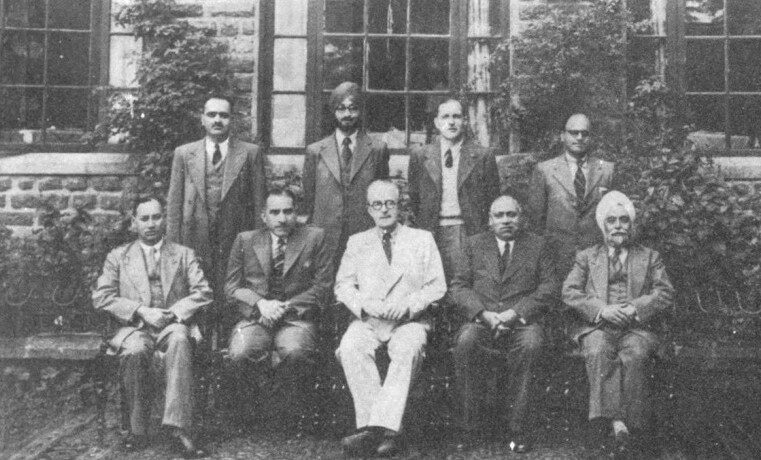
A testimony
The Weekly Insaf of 21 April 1966 stated:
“Mirza Sahib [Hazrat Musleh-e-Maudra] truly guided and represented the Indian Muslims during the hard times, when the eyes of many Muslim leaders used to be dazzled by the attractive disguise of the Congress.”
These were just glimpses of Huzoor’sra guidance and support to leaders of the Pakistan Movement and his role in the formation of Pakistan. It shows how he always strived for the rights of Muslims and desired for their prosperity.
اِک وقت آئے گا كہ كہيں گے تمام لوگ
ملّت كے اس فدائى پہ رحمت خدا كرے
“A time will come when all shall proclaim, ‘May God have mercy on this devotee of the nation.’”
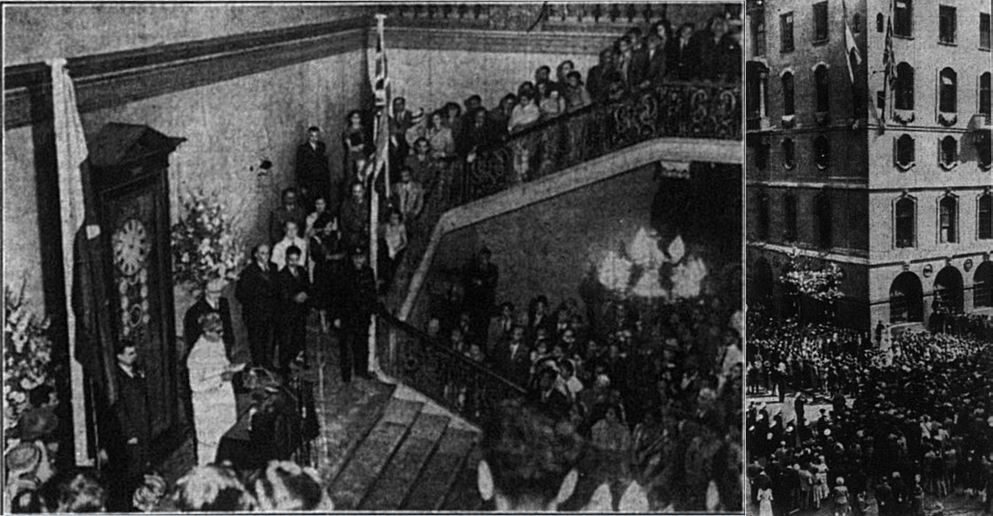
Related Content
- ‘The consolidation of Pakistan’: Lectures by Hazrat Mirza Bashiruddin Mahmud Ahmad on how Pakistan can see success
- Hazrat Musleh-e-Maud’s services to the Muslim cause: Nurturing the newly formed Pakistan
- Hazrat Musleh-e-Maud’s blueprint for a successful Pakistan: Highly praised yet neglected advice
- Sacrifice is the key to nation-building: Hazrat Musleh-e-Maud’s advice to the newly-formed Pakistan
- Promises made to minorities when Pakistan was created must be fulfilled: Hazrat Musleh-e-Maud’s guidance for Pakistani laws
- May India and Pakistan live amicably: The Partition of India, 1947 and Hazrat Mirza Bashiruddin Mahmud Ahmad’s heartfelt wish


He was far ahead of his times. Divinely guided leader blessed with unparalleled wisdom, vision and grit. He was really an intellectual powerhouse and has absolutely fullfilled the prophecy of the Imam of the age.